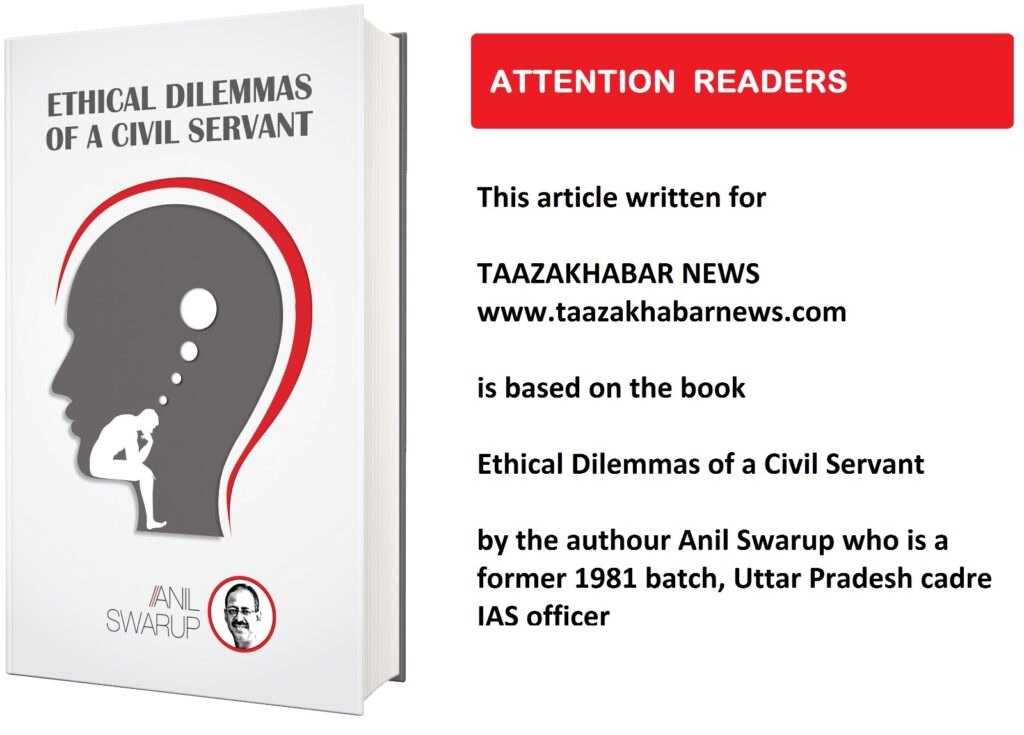
Ethics is defined as a set of ‘moral principles that govern a person’s behaviour or the way he conducts any activity’. Ethics or ethical behaviour pertains to certain socially acceptable norms of conduct that may not have been codified formally into a law or a rule, and therefore a violation of which does not always lead to formal penalty or punishment. Unethical behaviour may be frowned upon. However, it would not, normally, lead to any action against the person until the ethical breach caused by the person has been codified as a law or a rule. The significant objective of ethics pertains to defining the nature of ultimate values and standards by which human actions can be judged. And the purpose of ethics is to define the parameters of acceptable human behaviour by knowing the types of actions, and their consequences. It’s also imperative to keep in perspective the inherent limitations of both, i.e. the humans and their actions as well as their social acceptability.
Ethics could have come into existence only when human beings started to reflect upon the best way to live as a collective entity. The idea perhaps was to evolve the customary standards of right and wrong conduct that was acceptable to the majority. At some point of time in human history, it also got religious sanction or, in a sense, almost all religions adopted a code of conduct (like the ‘Ten Commandments’) that became an intrinsic part of their ethos.

In the context of bureaucracy, it evolved in a slightly different form as, over a period of time, a large part of ethical behaviour, i.e. what is expected of a civil servant, came to be codified and became a part of some legislation or a rule thereunder. Thus, dishonest conduct came to be punishable under the law. There is still, however, a large segment of ethical behaviour that is expected of a civil servant which is not codified.
Political alignment, if proven, can create problems for a serving civil servant as it violates a defined and codified code of conduct. However, a civil servant is expected to be politically neutral even if such conduct evidently or explicitly does not violate an express provision of the rules of conduct. There is, therefore, a huge debate about whether civil servants in general and those occupying constitutional positions in particular, like the Election Commissioner, should be allowed to join a political party after their tenure. Their joining a political party is not illegal by any stretch of the imagination, but it does raise ethical issues.

Objectivity and impartiality are virtues that a civil servant is supposed to possess and his advice and actions are expected to conform to those. There is no doubt that civil servants afflicted with intellectual dishonesty can cause enormous damage to governance. The extent of this damage can be truly witnessed in crucial situations wherein objective and impartial decision-making is of paramount interest such as handling of communal tension and conducting of election. In critical situations like these, civil servants cannot but be neutral and efficiently perform the expected role of upholding the spirit of democracy.

Moreover, in our present societal structure, while the rich and the influential are capable of looking after themselves, it is the poor who need to be taken care of. Not all laws and rules are clearly defined. If a law needs to be interpreted, it should be done in the interest of the poor. And this is one of the solemn responsibilities of a civil servant. Being humane and accessible therefore becomes sort of a prerequisite for these officers. However, there is no law that mandates the same. But one must say that by imbibing these attributes the officer gains an enormous amount of self-satisfaction. Needless to say it also provides the much needed succour to the recipient of his behaviour. Over a period of time, such officers are respected and remembered. In fact, one may say that they become role models for others.
Also Read: Why things don’t happen in the government?

It is also the job of a civil servant to protect the interests of the organisation to which he belongs. This may, on occasion, entail some sacrifice on his part. It would not only be ethical on his part to do so but it would also be practically beneficial as it could set an example for others to make similar sacrifices. The conduct of each officer is closely observed by those around him. If an officer does not protect his colleagues and subordinates, he cannot be formally penalised. However, it is ethically envisaged of him to protect them from unwarranted harassment or victimisation. Yet again, such conduct will be beneficial to the officer himself even otherwise as he will be perceived as a person who stands by his colleagues. He will be recognised and respected for his conduct. In doing so, he will be displaying a leadership trait as well. Moreover, as the captain of the ship, his appreciation of the good work carried out by his team members is not only ethically warranted but also infuses positive energy amongst them. Everyone wants to be complimented but, more often than not, we are found wanting in appreciating the good work done by others.
Also Read: Civil Servants – Good, Bad and the Ugly?

The key question, therefore, is: Why should a civil servant become ethical in his behaviour? The first step towards finding an answer to that would be to appreciate the fact that being ethical is the best option in the context of morality as an idealistic or altruistic concept. In fact, it is also the best option in the context of the officer’s career prospects. After all, the reputation of an officer is progressively built on the basis of his ethical conduct and that usually stands him in good stead in the future. Moreover, ethical behaviour also imparts an enormous amount of moral authority to the concerned officer. His team will follow him wholeheartedly and not just because he is the boss. All of this, eventually, will be reflected in his performance and outcomes.
It is, therefore, beneficial for a civil servant to be ethical. It pays to be ethical.

